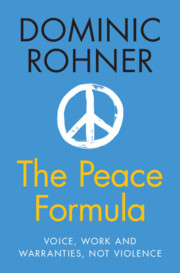
- Publisher:
- Cambridge University Press
- Online publication date:
- August 2024
- Print publication year:
- 2024
- Online ISBN:
- 9781009438322

Economic forces play a major role in the outbreak and perpetuation of violence, but they also hold the key for positive change. Using a non-technical and accessible style, The Peace Formula attacks a series of misconceptions about how economics has been used to foster peace. In place of these misconceptions, this book draws on rich historical anecdotes and cutting-edge academic evidence to outline the 'peace formula' – a set of key policies that are crucial ingredients for curbing armed conflict and achieving transition to lasting peace and prosperity. These policies include providing jobs (work), democratic participation (voice), and guaranteeing the security and basic functions of the state (warranties). Investigating specific political institutions and economic policies, this book provides the first easily accessible synthesis of this work and explains how 'smart idealism' can help us get the incentives of our leaders right. The stakes could hardly be higher.
‘This is an important book on the causes of violent conflict and its remedies by one of the world’s foremost scholars on the topic. In writing it for a wide audience, Rohner has succeeded in giving a lucid account of the complex research quest for robust results. Past public policy errors have much to answer for: the lives of millions of poor people have been blighted due to naivety and negligence. Governments, and the voters who elected them, both need to read it.’
Paul Collier - Professor of Economics and Public Policy, Oxford University, and author of Left Behind: A New Economics for Neglected Places
‘The number of conflicts in the world is once again climbing. In an important book, Rohner shows us that the biggest enemy to peace is over-simplistic solutions. The world needs to stop coddling unaccountable autocrats and give vulnerable people and democracies security guarantees and real investments in their futures.’
Christopher Blattman - author of Why We Fight
‘A pathbreaking synthesis of what we know about what causes conflict and how to stop it by the leading scholar in the field. Essential reading for the world in which we live now.’
James A. Robinson - Dr Reverend Richard L. Pearson Professor of Global Conflict Studies, Harris School of Public Policy, University of Chicago
 Loading metrics...
Loading metrics...
* Views captured on Cambridge Core between #date#. This data will be updated every 24 hours.
Usage data cannot currently be displayed.